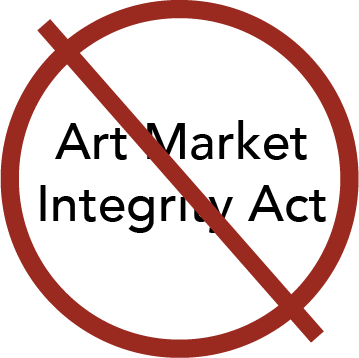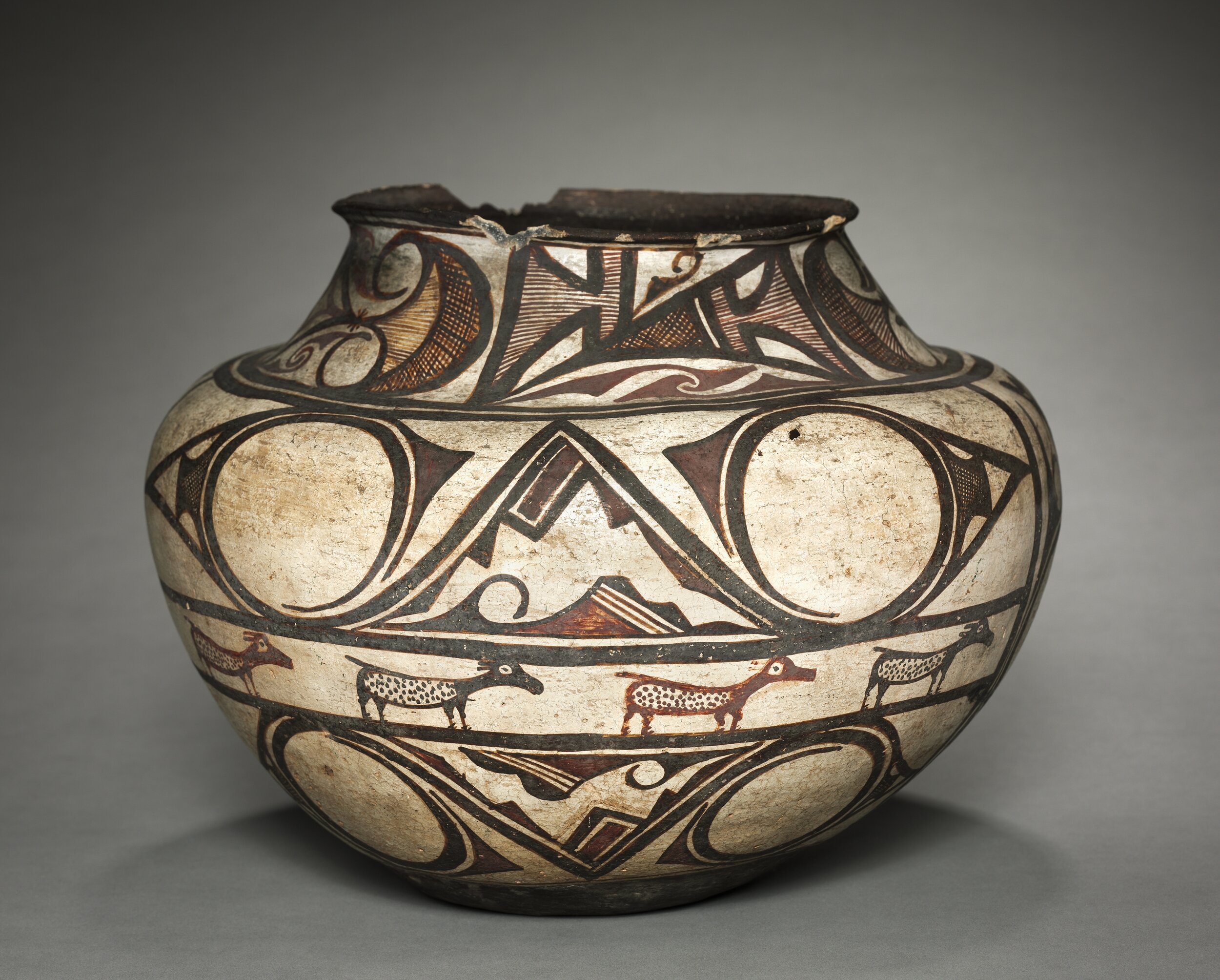ATADA Members,
Attached is the Advocacy Kit for the Art Market Integrity Act (S.2400) that was mentioned in the previous email. In it you'll find clear information about the proposed legislation and a sample message to send to your Representatives and Senators.
You can find contact info for your Congresspersons at:
https://www.congress.gov/members
More info about the proposed legislation can be found on the ATADA website at:
https://atada.org/atada-blog/art-market-integrity-act-notice
The “Art Market Integrity Act” Will Harm Your Business
To: All ATADA Members
From: Will Hughes, ATADA President
Our dedicated public servants in Washington, D.C. are again hard at work on legislation designed to burden small, art market businesses with damaging, costly and unnecessary regulation. A bi-partisan collection of strange bedfellows in the U.S. Senate introduced the “Art Market Integrity Act” on July 23, 2025.
The innocently named, yet grossly misguided bill, would force most art market participants to meet burdensome Anti-Money Laundering (AML) reporting requirements by setting thresholds for compliance as low as $10,000 per transaction or $50,000 in annual sales. Thus, even the smallest businesses and most part-time dealers would likely be subject to this proposed law. The Act would cover most participants in the art market, including, art and antiques dealers, advisors, auction houses, museums, custodians, and collectors.
U.S. art businesses, museums, and collectors will suffer significant harm and expense by the imposition of the same Federal reporting obligations on ordinary transactions as if they were financial institutions or casinos. Failure to meet these reporting requirements would expose art market businesses to draconian penalties. Most businesses would need to retain the services of AML consultants and to purchase AML software to ensure compliance.
One of the supporters of this misguided, and totally unnecessary legislation is the Antiquities Coalition. Yes, it’s the same organization that lobbied for the 2021 amendment to the Bank Secrecy Act that extended AML coverage to “antiquities” dealers. We are, thankfully, still awaiting the regulations that will define an antiquities dealer. Depending upon the ultimate definition of “antiquities”, many of our ATADA members will become subject to AML laws under that already passed amendment to the Bank Secrecy Act.
I’ve included a link to a good article on the proposed Art Market Integrity Act published in the Cultural Property News.
I would urge you to support the Cultural Property News as it is one of our only sources of timely and accurate information on cultural property issues and proposed legislation. As noted in the article, “the Art Market Integrity Act is Trojan horse, using the language of financial crime to pursue long advanced ideological goals aimed at eliminating the antiquities trade.” The foundation of the proposed Act rests on various false claims, misleading analogies, and a total disregard of the U.S. Treasury’s own findings with respect to money laundering and terrorist financing in the art market.
Time to get active! Contact your Senator (particularly if he happens to be one of the ill-informed sponsors of the proposed Act: John Fetterman, Chuck Grassley, Sheldon Whitehouse, Dave McCormick, Bill Cassidy and Andy Kim) and complain loudly about this misguided bill that will cause significant harm and incurred expense to small businesses. You could also decide to help support ATADA’s legal and lobbying efforts with your financial contribution. ATADA cannot have a significant impact in the legislative arena without adequate financial resources.
Support the Legal Fund
LEGAL FUND DISCLAIMER:
ATADA is a 501(c)(6) organization; gifts to ATADA and the ATADA legal fund are not tax deductible as charitable donations.
ATADA is a nonpartisan organization and does not support or endorse any candidate for office. Contributions and gifts to the ATADA Legal Fund will support lobbying and other activities.
ATADA’s tax status enables it to work directly in Washington and elsewhere to make real change for your benefit.
Memo on Pennsylvania Bill to Further Restrict the Ivory Trade
ATADA Members,
The Pennsylvania House is currently considering HB 994 which would impose severe restrictions on the purchase, sale or possession of objects made from or containing ivory (and certain other specified animal parts). If you sell covered objects in Pennsylvania, or source covered objects in Pennsylvania, I encourage you to read the pending HB 994 and to weigh in with PA legislators before the bill passes in its current form.
There are certain exemptions to the restrictions contained in HB 994, dependent upon the provenance and age of the ivory contained in an object. It is uncertain, however, what documentary proof will be required to satisfy the terms of the various exemptions. In addition, these exemptions will only apply if the total weight of the ivory contained in the object is less than 200 grams (slightly less than ½ pound). It appears that there are no exemptions to the ban on the purchase, sale or possession of objects made wholly or primarily of ivory (including most marine ivory). The PA law is clearly much stricter than applicable Federal law.
If you may be affected by PA House Bill 994, I suggest that you take a closer look at the proposed legislation:
https://www.palegis.us/legislation/bills/2025/hb994
If you don’t like what you are reading, contact your PA representative or the bill’s sponsors to express your concerns.
Finally, I’ve attached a July 14, 2025 article from Antiques and the Arts Weekly which provides further information.
https://www.antiquesandthearts.com/pa-house-bill-994-proposes-to-further-restrict-ivory-trade/
-Will Hughes
President, ATADA
Memo on New EU Import Regulations
ATADA MEMO ON NEW REGULATIONS ON IMPORTING CULTURAL GOODS INTO THE EUROPEAN UNION
A heads-up to all ATADA members that sell tribal art and antiquities to EU customers. Regulation (EU) 2019/880 takes full effect on June 28th and will present significant challenges to the ongoing trade with EU based customers. The law will not affect all our dealer members as it applies to cultural goods over 200 years old (250 years for archeological objects and elements from monuments) and worth more than 18,000 euros (including all associated costs, such as sales tax, insurance, packing and shipping). There is no minimum worth for archeological objects and elements from monuments.
The impact of the new regulation could be severe for EU collectors and dealers because the obstacles to importing certain categories of cultural property may well discourage them from buying outside the EU. Buyers may be understandably discouraged because the regulation will entail additional paperwork for imports, cause delay if an import license is required, and require declarations under “penalty of law”, and pose the risk of seizure and confiscation. Please note that only the EU-based owner of the goods may initiate and complete the import process required by the regulation.
What role will the U.S. based seller play when contacted by an interested EU-based buyer of an object covered by the new regulation? First, from a pragmatic point of view, you must determine how likely it is for your client to be sufficiently motivated and interested enough to complete the import process themselves? Second, you must ascertain if the provenance of the object will meet the stated requirements of the regulation.
You must be able to supply your client with specific, accurate evidence/information concerning the object to be imported. Your client will be making a declaration as to the veracity of such provided information under penalty of law.
The EU-based importer (owner) must sign a declaration that the object was legally exported from its country of origin under the local law at the time of export. In many, if not most cases, evidence to prove legal export from the country in which the object was created or discovered is non-existent. Therefore, in many cases you may not have the information required to supply your customer with evidence to support a declaration as to the legal export of the object from its country of origin. The regulation does provide a workaround when the country of origin cannot be identified, or proof of the original lawful export cannot be provided or does not exist. If the object was exported from its country of origin before April 1972, the regulation allows for the introduction of evidence that the object was lawfully exported from the last country where it was continuously located for at least five years.
There is uncertainty over what qualifies as sufficient documentation for compliance. Guidance from EU bureaucrats has been somewhat conflicting thus far. The proof to obtain an import license for archeological objects could prove daunting: complete files, including export permits where available, customer records, sales invoices, shipping documents, title chain, catalog entries and photos. Non-archeological cultural property will require an importer’s statement, including a due diligence declaration, and EU customs may request supporting documents or additional documents at any time from the importer. Issued guidance suggests that a declaration under oath of a third party regarding the legal export of a cultural good may be acceptable in the absence of any other relevant documents. It also appears that detailed auction or exhibition catalog descriptions along with identifying photos might be sufficient evidence of original legal export (or location for 5 years within the last country from which the object was exported from) to permit the issuance of an import license or acceptance of an import statement.
There will be an interesting intersection between Regulation (EU) 2019/880 and the STOP ACT once the act’s final implementing regulations are issued and the export certification process itself is established. As to Native American and Native Hawaiian objects, if an exporter/seller obtains Export Certification under STOP for a particular object, such certification would be persuasive evidence of lawful export from the country of origin, the United States. If it actually proves possible to obtain export certification under STOP (or that the final regs clearly define those objects that do not require export certification), STOP may facilitate the export of certain Native American and Native Hawaiian objects to the EU.
-Will Hughes
President, ATADA
Disclaimer:
The foregoing is intended only as a reminder that Regulation (EU) 2019/880 takes effect in just a couple of weeks, and that it will profoundly change the import of cultural property into the EU.
ATADA strives to provide timely, general information regarding laws and regulations potentially affecting its members. ATADA does not provide specific legal advice to individual members. If you have a question about the impact of the new EU regulation on your particular transaction, please consult legal counsel with cultural property expertise or a specialized customs broker.
NAGPRA Revisions for 2024
In a recent newsletter, Will Hughes highlighted a few of the revisions to the Native American Graves Protection and Repatriation Act of 1990.
Kate Fitz Gibbon has written an in-depth, 26-page report on the revisions which came into force in January 2024. The report describes the impact these new regulations are having on museums, educational institutions, donors and researchers, as well as updated definitions of terms such as "cultural items", "sacred objects", and "cultural patrimony", among others.
If you have not already done so, I urge you to read the full report on the Cultural Property News website at:
https://culturalpropertynews.org/the-new-nagpra-traditional-knowledge-in-artifacts-out/
STOP Act Information - January 2023
This information is current as of January 16, 2023. We will provide updated info as it becomes available.
THE STOP ACT HAS PASSED.
WHAT DO I NEED TO KNOW? WHAT DO I NEED TO DO?
The Safeguard Tribal Objects of Patrimony Act of 2021 (the H.R. 2930 version) was passed by the Senate on November 29, 2022 and was signed into law by President Biden. The stated purpose of the law is to stop the export and facilitate the international repatriation of cultural items prohibited from being trafficked by the Native American Graves Protection Act (NAGPRA), and archaeological resources prohibited from being trafficked by the Archaeological Resources Protection Act of 1979 (ARPA) or any other Federal law or treaty. The STOP Act explicitly prohibits the export of items obtained in violation of NAGPRA, ARPA or any other federal law and in addition creates an export certification system for other items that may be exported but only after receiving export certification from the Interior Department.
Many ATADA members have requested guidance on how to navigate the export of Native American or Native Hawaiian objects after passage of the STOP Act. We follow with the best guidance that we can offer at this early stage.
Detailed guidance can’t be offered yet as to which Items require export certification or which items ultimately will not require any certification at all to export. The definitions contained in the law itself of items covered are vague, and we do not yet have the final or even proposed implementing regulations for STOP to give us further guidance.
It will take a year, perhaps more, for the Interior Department to go through the process of issuing proposed regulations all the way through to the adoption of final regulations. In the meantime, there will be no functioning export certification system, so compliance with STOP’s export certification provisions cannot yet be expected from exporters as to “Items Requiring Export Certification” under the law.
At this point, the only provisions of STOP that are now fully effective and enforceable are those provisions related to the ban and penalties attached to the export of an “Item Prohibited From Exportation (essentially items being “trafficked” in violation of NAGPRA, ARPA or any other Federal law).
Accordingly, the best advice right now is to be very cautious if you are exporting an item. Don’t attempt to export any item that you think may have been obtained in violation of NAGPRA, ARPA or any other Federal law. Of course, you should have been following such advice even before the passage of STOP. While we don’t see a legal justification for U.S. Customs to change its procedures before STOP regulations are finalized, it is also possible that Customs could raise questions about exports of antique or prehistoric objects based upon its own interpretation of authority derived from STOP’s export ban on Items Prohibited from Exportation. So again, be very cautious when considering the export of an item which could reasonably be characterized as a “cultural item” or “archaeological resource” under NAGPRA or ARPA.
Provenance has always been important, but under STOP it will be critical if you intend to export an item. Good documentation could be the key to a smooth export process.
Until we have final implementing regulations, the best course of action is to be fully prepared to document the provenance of all the Native American and Native Hawaiian items in your inventory or collection to the greatest extent possible. The best provenance, although admittedly rare, will provide documentation of the original acquisition of the piece from a tribe, tribal member or Native Hawaiian, or the original discovery of an archaeological piece. For example, a photo of a Great Aunt at Acoma Pueblo in 1905 holding the dough bowl she just purchased, or a photo of a Great Grandfather holding an Anasazi pot that he found on his ranch in Southern Colorado in the 1930’s. The next best provenance would be documentation of an early acquisition history, the earlier the better. For example, the Harvey House souvenir shop receipt a Great Aunt received for a piece purchased in 1915; or the receipt for a Hawaiian object that a Great Grandfather purchased at an antique shop in Honolulu in 1895. If you have a documented provenance before 1979, then the object cannot have been trafficked in violation of ARPA; if you have a documented provenance before 1990, then the object cannot have been trafficked in violation of NAGPRA. It is clear that objects lacking any credible provenance at all will not be eligible for export certification under STOP, and certain types of objects with only a very recent provenance may be unlikely to receive export certification. Objects that can be characterized as funerary items are very unlikely to receive export certification as in most cases the exporter will be unable to meet the burden of proof of a “right of possession” to the such object.
Note: The information contained on ATADA’s website and in e-mail communications to its members is provided for informational purposes only and should not be construed as legal advice on any subject matter. Anyone seeking specific legal advice or assistance should retain an attorney.
Open Letter on Damaging Anti-Money Laundering Legislation
From: Will Hughes
Date: March 23, 2022
ATADA Members,
Below is a link to an important open letter from CINOA (joined by ATADA) which was published by the Art Newspaper. It was submitted to publications in Europe & the U.S. and we expect it to be widely picked up, in whole or in part.
https://www.theartnewspaper.com/2022/03/14/damaging-and-unjust-legislation-linking-art-and-antiques-trade-to-money-laundering-and-terrorism-financing-must-stop-industry-body-says
Sincerely,
Will Hughes
Support the ATADA Legal Fund
You can help us continue our work to protect your rights as dealers and collectors. Your contribution is greatly appreciated.
Anti-Money Laundering Legislation Will Affect You
Legal artifact collecting, small businesses and hobbyists are directly threatened by legislation that could kill small businesses trading in artifacts and antiques.
On Jan. 1, 2021, Congress passed the National Defense Authorization Act (NDAA). Under Section 6110, this bill called for the Bank Secrecy Act to be amended to subject all “antiquities dealers” to anti-money laundering regulations that could drive small traders in antiques and artifacts out of business. This legislation makes “antiquities dealers” – who are not defined - into "financial institutions" under the Bank Secrecy Act.
Regulations are being written today aimed at people who legally collect artifacts, who go to artifact shows and who buy, sell or trade them.
How could regulation affect you? Typical Bank Secrecy Act rules would require all “antiquities dealers” with sales of $50,000 a year to collect private information including the name, address, and source of their money from buyers and sellers and file transaction reports with FINCEN (the Financial Crimes Enforcement Network), a Treasury entity. FINCEN shares this information with US tax authorities and police in 90 countries around the world.
Dealers could be required to do an annual independent audit and file Suspicious Activity Reports on cash or large sales over $2,000-$3,000. Anti-money laundering programs even for small businesses can cost thousands of dollars per year as well as the time required to comply. It is impossible to fly under the radar; regulations are enforced by the banks that will freeze or close accounts which do not comply.
American businesses, traders, and collectors, large and small, should ask FINCEN to define “antiquities” as narrowly as possible and to adopt high monetary thresholds before reporting is required.
The Treasury was given one year to decide what regulations to impose on the trade. FINCEN will soon announce a “Comment Period” for the public to respond to proposed regulations via the Federal Register. ATADA will post instructions below.
As soon as the Comment Period opens, it will be crucial to let U.S. FINCEN regulators – and your Senators and Congressmen – know that they should exempt the small businesses of the American Indian art and artifact trade from unnecessary regulation. Make YOUR VOICE count!
When the proposed regulations are issued and the comment period opens, ATADA will post links and instructions here.
The STOP ACT, HR 2930, S 1471: Draconian Legislation Threatens Collecting and Trade in Native American Art
Legislation that could lock Native American art within U.S. borders is pending again in Congress. The STOP Act threatens the tourist-dependent economy in the Southwest, calls for an unworkable export regime with no time limits, applies to objects of any age and value, lacks Constitutional safeguards and operates in secrecy – denying Freedom of Information Act access even to an exporter whose goods are seized. The STOP Act would require tourists as well as commercial exporters to submit photos and forms and obtain permissions for exports as low as $1 value.
This latest version of STOP is identical to a bill that was introduced in the Senate and was passed by the Senate, but not the House, at the end of 2020. ATADA has major concerns with STOP’s secrecy, its lack of transparency and public accountability.
ATADA supports halting illegal trade, whether it takes place in the US or overseas. We worked together with the Acoma Pueblo in 2018 to do exactly that, in a bill introduced by former NM Congressman Steve Pearce, H.R.7075.
ATADA fully supports bringing sacred items back to tribes. This is the goal of our highly successful Voluntary Returns Program, which has brought over 400 sacred objects to Native American Sovereign Nations over the last five years.
Here’s how the current STOP Act goes beyond its stated objective to ban export of illegal items:
Placing the burden of proof of lawful purchase from tribes on the exporter. The lack of ownership history of most items creates a de-facto export ban.
STOP lacks a “knowing” standard threatening law-abiding citizens with criminal prosecution.
Even “solely commercial” items can be denied export at the discretion of a tribe.
It puts no time-limit on certification review serving as a bar to commercial transactions and foreign museum loans.
Tribes have the right to review of all certification applications and appeals are limited, giving tribes unchecked authority to ban any and all exports.
Tribal communications and application records are exempt even from Freedom of Information Act requests, denying exporters access to evidence to contest seizures.
The ultimate long-range goals of STOP may be those articulated by the Association of American Indian Affairs/AAIA. The AAIA has said that: “Title to items of Native American cultural heritage must be vetted with affiliated Tribal Nations.”
A Better Alternative to the STOP Act
ATADA, the Authentic Tribal Art Dealers Association, believes it is crucial to honor Native American traditions, to ensure the health and vitality of tribal communities, and to respect the tribes’ sovereign rights. That is why both ATADA and the Acoma Pueblo worked with New Mexico Congressman Steve Pearce when he introduced a 2018 bill, H.R. 7075, The Native American and Native Hawaiian Cultural Heritage Protection Act.
H.R. 7075 was a far better bill. It was supported by Acoma Pueblo and ATADA. It addressed many of the same goals as the current STOP Act. It banned the export of illegal items. It enabled tribal review. Unlike STOP’s burdensome export system, which would have to be created from scratch, H.R. 7075 used a permitting process already familiar to Customs and provided for a more user-friendly certification process.
Importantly, it preserved the rights of all Americans to due process – which STOP does not.
That compromise has been rejected by Acoma’s new leadership. STOP substitutes a vague, start-from-scratch permitting system, without public accountability. In fact, STOP would explicitly restrict export of commercial items at the discretion of the tribes.
ATADA supports legislation to preserve tribal heritage. Wouldn’t it be better to amend STOP, using the 2018 Native American and Native Hawaiian Cultural Heritage Protection Act as a model acceptable to all?
ATADA should be judged by its actions. In 2016, ATADA created the Voluntary Returns Program, a community-based initiative that has so far brought over 300 sacred and highly valued ceremonial objects to Native American tribes, completely free. Returns take place through a consultative process in which ATADA representatives work directly with community and spiritual leaders of Native Nations. ATADA is truly committed to bringing sacred objects back to tribes.







